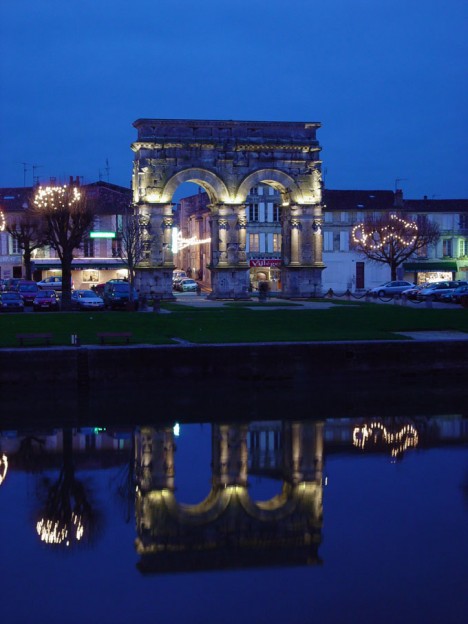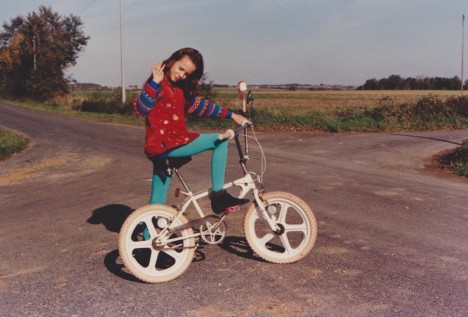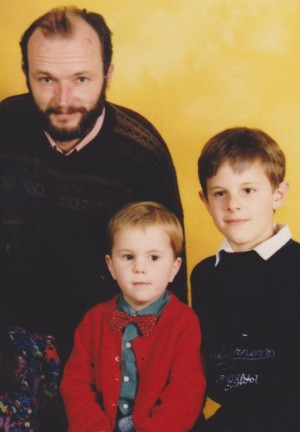It happened like this … an English family move to France. Part 9. Homesick.
Although we found a buyer for our house relatively quickly, Completion dragged on for over a year. He was buying, he wasn’t, he was buying, he wasn’t … I packed things and unpacked them, phoned the notaire, faxed him, stared at the telephone, stared at the fax, stared at the sky. We heard that the buyer had moved to Hawaii. We heard that he was now in Portugal.. We heard that he was moving here after all. I put the property back on the market, showed more people around it, heard good news from the notaire and took it off the market again. Another long silence, so I put the house on the market once more, showed people around … on and on till finally Completion, well tattered and almost unrecognizable, limped through the door.
A peaceful haven ..
Like most women, my heart just went out of the house as soon as I knew we were selling. All the work we had lovingly put in became irrelevant, and all I could see was a monster in need of constant maintenance. What had once been a peaceful haven for me where I could lick my wounds, became an isolated and cold wind-swept batisse that I no longer wanted to live in. A large damp patch developped near the front door, the upper stair carpet started to fray in one corner, the fleur-de-lys floor tiles in the hall became too tedious to clean, and the flower beds were just fine with weeds in ….
 Pippa waiting for the school bus outside our front gates. One year when we were camping in Spain we bought two concrete lions and, with the aid of a digger, hoisted them up on top of those pillars. As far as I know they are there to this day.
Pippa waiting for the school bus outside our front gates. One year when we were camping in Spain we bought two concrete lions and, with the aid of a digger, hoisted them up on top of those pillars. As far as I know they are there to this day.
I wanted to go home …
… more than anything . We sat down and did the sums over and again, and it didn’t matter which way round we calculated it, we would be utterly broke if we went back to the UK, would have to find work somehow, the children would have to start all over again in the UK system … it just didn’t make financial sense, nor practical sense. And any emotional sense would soon be thwarted by the practicalities of life.
I had access to a lot of properties because of my business. I had seen every kind of property under the sun, both inside and out, and had negotiated every step of every element in a hundred and one deals. I knew what we were about, what the values were, which loans were available, who to contact. I could tell at a glance anything that was a quick camouflage job, indoors or out, I could judge the state of the roof, I could spot termite trails a mile off. I knew all about the little hitches that could wreck a potential purchase, where and how to check the title of the vendors, where and how to check the boundaries of the land.
I was no longer the young woman who thought she was busy because she had a baby and two children. I knew what real busy was, and I knew all about stress and disappointment. I had changed. And although I was aware I had developped a kind of hardness, a water-off-a-duck’s back attitude to so many things, I felt I was probably a better person. A wiser person, certainly.
 We both liked the old Roman town of Saintes, and toyed with looking there. I had never lived in a town, though Saintes is not big. It is still my favourite town in the area. Until 1810 it was the “capital” of what was then called the Charentes-inferieures (Charente Maritime) but, like so many towns of its ilk faded in to grubby obscurity till it was restored and put on the map, as it were, in 1990. The river Charente runs though it, lovely for boating or walking, and there is an excellent pedestrianized area with lots of shops and restaurants.
We both liked the old Roman town of Saintes, and toyed with looking there. I had never lived in a town, though Saintes is not big. It is still my favourite town in the area. Until 1810 it was the “capital” of what was then called the Charentes-inferieures (Charente Maritime) but, like so many towns of its ilk faded in to grubby obscurity till it was restored and put on the map, as it were, in 1990. The river Charente runs though it, lovely for boating or walking, and there is an excellent pedestrianized area with lots of shops and restaurants.
Red tape.
In the meantime, if I was to work, which I was, I still had to obtain my Carte Professionelle. I hurled myself in an impressive variety of somersaults as I found the torturous routes through the system, which seemed to be designed on purpose to make everything as difficult as possible. I became an expert acrobat, brilliant at walking a tightrope. Nothing phased me any more. I had been there. Done that. At the time it seemed to me that France wallowed in bureaucratic nightmare, but I now know that Britain is the exception – Britain, the US, Australia and other English-speaking countries. We are “free” and, providing we obey the law we may do as we wish, within reason. On the Continent it is the opposite – you may do as you wish providing there is a law permitting you to do so. That is why the French use expressions such as “je n’ai pas le droit” which you would never hear in English.
I have no idea how many phone calls I made, nor how many letters I wrote, but I had to drive to La Rochelle (almost an hour) on five or six occasions and eventually met the Mr Valtel I had been told about. Actually, he was very kind and really wanted to help me. He was the first to admit the system was ridiculous and that I had been badly served. He helped me through several loop holes as I got my dossier ready. This included, I recall, having an “official police translater” translate my papers – which cost me quite a lot of money, but was a requirement. She translated “estate agent” as Agent of the State, which caused great hilarity in Valtel’s office. Another police official had written that I had been born in Cape Province, South Africa, Angleterre.
Not that I wish to ridicule the police – I am a great admirer of the police. But I think the point is perhaps that they are precisely that – the police, invented for catching criminals, not for filling in forms with the likes of me.
The red tape was such that even Valtel had to make phone calls to obtain information. On one occasion, with me in his office, he phoned the Minister of Somethingorother in Paris. He flicked the phone on to loud speaker and explained my situation. The Minister listened.
“Ecoutez,” he said after a while, “il ne faut pas trop leur aider, les anglais. Qu’elle rentre chez elle si elle n’aime pas.”
Translated: Listen, you musn’t help the English too much; if she doesn’t like it she can go home.
Valtel was mortified.
To cut a long story short, and after months and months and months, my Carte Professionelle was refused by the Powers That Be in Paris. The reason was because I was a foreigner. I was certain that was discrimination and that I could have kicked up a fuss.
“You are, in effect, forbidding me to work!” I exclaimed.
 Our delicious boys!
Our delicious boys!
Exhaustion
But, truth be told, I no longer cared. I was seriously exhausted. You wouldn’t think it but clients are very demanding. Perhaps any job where you work with the public is demanding in a way that it isn’t when you work with a colleague or two, or an inanimate object of some kind. I had to keep up a pleasant and smiling facade, be interested in what they were saying, not mind their children filling my car up with crisps and screaming in my ear … hour after hour, day after day, and all in the hope they would buy something. And then I’d be so pleased because they wanted to buy something, I’d let the notaire know, let the vendor know … pat the whole thing through months of paperwork to Completion, be available on the phone for idiot questions and requests, (“Oh Catherine! So glad to catch you! Would you mind popping over to our place … he he, well, the one we are buying, and measuring the skirting boards for me?”) keeping my clients happy with their purchase till I got my commission cheque. But often enough, for no good reason, the clients would change their minds and the sale would fall through. Nobody paid me. I had to create my own money. Often enough it was exhilarating but sometimes it was gutting.
These things don’t sound so bad in themselves, I know, but it was continuous. After a full day’s work and with three small children, it was sometimes as much as I could stand.
And so I stopped. Just like that. I was not willing to battle for the Carte. I was not willing to exhaust myself any further. I wanted to be at home with my children. We were selling up and moving to the coast where, I hoped, there would be a bit more life and laughter. I took out the last few of my clients (breaking the law utterly) and then handed them over to the notaire. Waved. Said goodbye.
 Jake playing in some drains on a building site. Isn’t it funny how, thirty years later, you can still recognize the clothes your children wore ? I remember that little sweat-shirt; it had baa-lambs on it.
Jake playing in some drains on a building site. Isn’t it funny how, thirty years later, you can still recognize the clothes your children wore ? I remember that little sweat-shirt; it had baa-lambs on it.
Health matters.
We found that Bruce’s Meniere’s would come and go. There was no two ways about it, but the arrival of the post, which could quite plausibly herald some dreadful letter from some authority somewhere, triggered it off. The phone ringing. People rang in the evenings, when he was home and the calls were cheaper – giving him no rest once he got home. It drove us both mad, trying to get supper, get the children off to bed, tidy up, rest a bit – and that phone kept ringing. We were obliged to answer it. That was how we made our money. Sometimes it was one of Bruce’s clients to say he was delighted with the mezzanine, or another client to say he was furious the electrics were not finished. Frequently it was somebody being thoughtless, all wrapped up in their own project of a house in France and totally forgetting that we were real live human beings that needed time off.
Sometimes Bruce was so ill all he could do was lie on the floor. He said he couldn’t fall off the floor. At other times it was just a maddening buzzing in his head.
Something had to change and we had to find a different way of earning money.
 We cycled almost every Sunday unless I had clients. The roads around Primrose were very quiet and fairly flat.
We cycled almost every Sunday unless I had clients. The roads around Primrose were very quiet and fairly flat.
Finding a suitable property
Of the thirty or forty properties that I knew were for sale, none was suitable for us. We had become accustomed to large, airy rooms and big windows. We were used to a lot of space and plenty of quiet. With a limited budget (despite selling Primrose at a juicy profit) there were not that many houses available for us to look at. Furthermore, property near or on the coast was more expensive – still very cheap compared to Britain, but almost beyond our budget. To top it, there was very little indeed in the way of buildings for renovation and the few that there were tended to be village houses in run-down little streets, or grotty farm dwellings with no architectural relief, never mind pleasant views, and surrounded by nasty modern bungalows.
We both had a wild idea that we could perhaps buy a modern property in need of no work. That appealed to us for a while, and Lord knows there were plenty of recently-built properties all along the coast, most of them square and unattractive boxes. I love the turn-of-the-century, ie 1900s, seaside architecture but anything we liked as also too expensive, though for a while we did consider a magnificent house on a cliff, overlooking the sea, near Royan. It had been “restored” in the 1960s and everything needed re-doing, so it was just up our street. Some bright spark had even removed the original staircase and replaced it with a “modern” concrete one, complete with duff-coloured tiles! But no, that sea view, so lovely, so hypnotic in the summer, would become a fierce and icy enemy in the winter. So the hunt continued.
And it was one day, as we returned from a day trip cycling with the children on the island of Oleron, that we drove past a huge old house with a For Sale sign.
“Talk about a white elephant!” I exclaimed.
“Hmmph!” agreed Bruce, “I wonder which idiot is ever going to buy that?”
Catherine Broughton is a novelist, an artist and a poet. Her books are available from Amazon/Kindle or can be ordered from any leading bookstore or library. They are also available as e-books on this site.
https://www.facebook.com/catherinebroughton2 join Catherine on Facebook!





